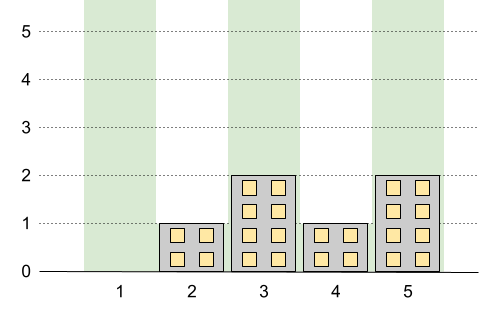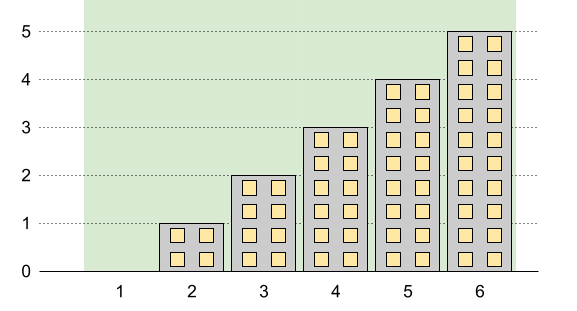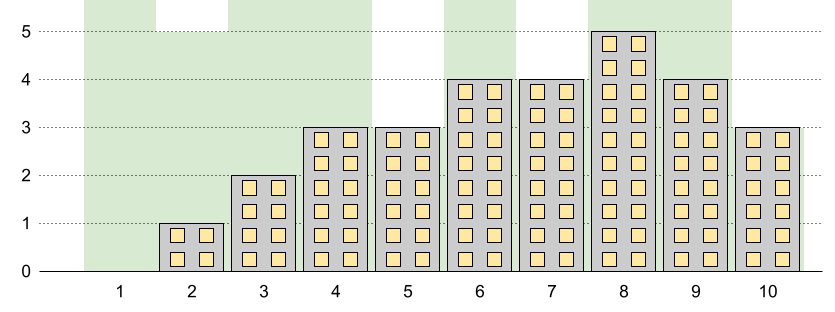You want to build n new buildings in a city. The new buildings will be built in a line and are labeled from 1 to n.
However, there are city restrictions on the heights of the new buildings:
- The height of each building must be a non-negative integer.
- The height of the first building must be
0. - The height difference between any two adjacent buildings cannot exceed
1.
Additionally, there are city restrictions on the maximum height of specific buildings. These restrictions are given as a 2D integer array restrictions where restrictions[i] = [idi, maxHeighti] indicates that building idi must have a height less than or equal to maxHeighti.
It is guaranteed that each building will appear at most once in restrictions, and building 1 will not be in restrictions.
Return the maximum possible height of the tallest building.
Input: n = 5, restrictions = [[2,1],[4,1]] Output: 2 Explanation: The green area in the image indicates the maximum allowed height for each building. We can build the buildings with heights [0,1,2,1,2], and the tallest building has a height of 2.
Input: n = 6, restrictions = [] Output: 5 Explanation: The green area in the image indicates the maximum allowed height for each building. We can build the buildings with heights [0,1,2,3,4,5], and the tallest building has a height of 5.
Input: n = 10, restrictions = [[5,3],[2,5],[7,4],[10,3]] Output: 5 Explanation: The green area in the image indicates the maximum allowed height for each building. We can build the buildings with heights [0,1,2,3,3,4,4,5,4,3], and the tallest building has a height of 5.
2 <= n <= 1090 <= restrictions.length <= min(n - 1, 105)2 <= idi <= nidiis unique.0 <= maxHeighti <= 109
impl Solution {
pub fn max_building(n: i32, mut restrictions: Vec<Vec<i32>>) -> i32 {
restrictions.push(vec![1, 0]);
restrictions.sort_unstable();
if restrictions.last().unwrap()[0] != n {
restrictions.push(vec![n, n - 1]);
}
for i in 1..restrictions.len() {
restrictions[i][1] = restrictions[i][1]
.min(restrictions[i - 1][1] + restrictions[i][0] - restrictions[i - 1][0]);
}
for i in (0..restrictions.len() - 1).rev() {
restrictions[i][1] = restrictions[i][1]
.min(restrictions[i + 1][1] + restrictions[i + 1][0] - restrictions[i][0]);
}
(0..restrictions.len() - 1)
.map(|i| {
(restrictions[i + 1][1] + restrictions[i][1] - restrictions[i][0]
+ restrictions[i + 1][0])
/ 2
})
.max()
.unwrap()
}
}

